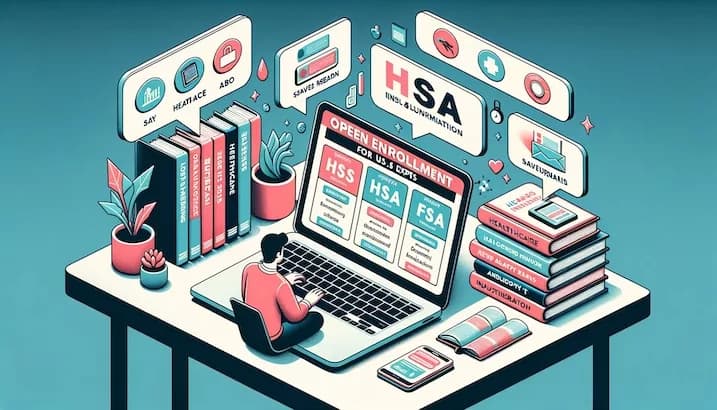Expat Medical insurance in the US update Jun 2022
I learned the hard way that US healthcare costs 5x more than Singapore—but you can save hundreds by shopping around for meds and never paying the first bill.
Updated for 2026: This post was originally published in 2022. For the latest IRS figures and a comprehensive guide, see Expat Healthcare Benefits in the US: HSA, FSA & HDHP Guide (2026).
Healthcare cost in the US is astronomical and that is not an exaggerated word. Our family moved from Singapore to the US late last year and we have been experiencing the cost of the US health care system firsthand. In this post, I will share everything that I have learned via reading, listening to podcasts, and our own experiences. Most of the learnings below are from the episode "hacking healthcare, prescriptions, and medical bills with Marshall Allen" on the "All the hacks" podcast. Marshall is a journalist, who has investigated the health care industry in the US for more than 15 years. In 2021, he published the book "Never Pay the First Bill". I highly recommend listening to the episode.
As this is a complicated subject, if I get something wrong, please leave a comment and I will correct it.
1. Medical, dental, and vision insurance plans are extremely expensive
While this is a well-known fact, the insurance premium is still at least 5 times more expensive than what we used to pay in Singapore. But since medical bills without insurance are even more expensive so well, there is nothing you can do except go with the company's typical medical, dental, and vision insurance plan as you relocate. There are just too many other things to worry about.
2. Make sure you have coverage from day 1
This means that the day you and your family land in the US, you start having coverage. The benefit of this is that for whatever, if you or your family member need to see a doctor or visit the hospital shortly after you arrive, then you are covered by insurance. The downside is that you need to pay the insurance premium a bit earlier. I think it is worth it.
In our case, unfortunately, our daughter had fever and skin rashes on her face a few days after arrival. And we had to bring her to the hospital to see a doctor. Her condition was not serious, which was a relief and the doctor spent about 10 mins with us. The bill without insurance was close to $400, which I think is outrageous.
3. There is extreme price variation with medication
I was shocked to find out at first. Basically, even for the same over-the-counter medication, the price varies widely between retailers. I found it out by myself at first when I compared the price between CVS and Amazon for the same drug. CVS's price was 2 times more expensive than Amazon's price for the exact same item (same brand name, same formula, etc...).
And then I came across this article from Consumer Report. It shows that the price difference can be more than 10 times between retailers. :(
So unfortunately this means you need to do a bit of research to find out the best price before your purchase of simple, over-the-counter medication. Try websites like:
Generally, do not buy from CVS if you can buy the same item from Amazon or other places as CVS is generally more expensive in my experience.
If you have a little bit more time, I would even recommend looking at the ingredients/formula of the branded medication and then buying an equivalent, generic drug instead. You can save more than 50% this way. Of course, this is assuming that you actually read the labels and can compare the ingredients. And I don't recommend doing this for serious health conditions.
4. Extreme price variation exists everywhere else within the US healthcare system
The example that Marshall gave in the podcast is with Imaging like X-Ray, CT scan, or MRI scan. The price difference can be 50% or even more. And unfortunately, the imaging service at the hospital you go to is often more expensive than somewhere else. This is a real hassle I know! But now that I know this fact, I will do some research the next time I need a scan.
5. But my out-of-pocket payment is small so why care?
There is no free lunch so the money is coming from somewhere. When the total bill is high and your out-of-pocket payment is small, it means overtime your premium or deductible is likely to go up. And by the way, even if you think that since you are under the company insurance plan, why does it matter? Well, when the cost of medical insurance goes up, it means the company needs to fork out a larger amount to pay for it. And that means less money to pay your wages and other benefits.
6. The healthcare cost is simply made up by the hospitals or providers
I was puzzled about why simple procedures in the US cost so much more than what I used to pay in Singapore? For example, as part of the annual health check, we did a simple blood test. But the cost is astronomical vs the value we received. The same (or even more comprehensive) blood test in Singapore costs 50%+ cheaper. The technicians/healthcare professionals in Singapore have high salaries so the reason for the high cost can't be because of the cost of labor. Singapore uses similar or even more advanced machines to provide better tests so it is not the machine cost either.
Of course, with the insurance, the amount we have to pay reduces but even that is not value for money. Marshall Allen explained that the cost is totally made up. As part of the game, the hospitals/healthcare providers make up the very high price so that the insurance companies can show you that through their medical insurance plan, you get a much more discounted price. But the key is that the initial price is Made up!
How crazy is that as a system?
7. Need to check the itemized bill carefully
I heard about this from the podcast but I didn't believe it until it actually happened to me. I was alerted by the insurance provider that I owed the family doctor's office money. I was puzzled by that because the annual health check-up should be included as part of the package and I shouldn't have to pay anything out of pocket. So I called the insurance company, who then called the family doctor's office. It turned out that they used the wrong billing code for other visits so it appeared that I have had two consecutive annual health check-ups in the span of 2 months.
So luckily I did check the itemized bill before I paid, otherwise, money is lost :D
8. Look into Health saving account (HSA)
I didn't know about the Health saving account (HSA) from the beginning (or rather I didn't understand it enough to leverage it). If you qualify through a High Deductible Health Plan, you should read about it extensively because it's likely that it is beneficial for you to put pretax money into HSA. You should also look into Flexible Spending Accounts (FSA) as another way to save on medical costs. You can use money from HSA to pay for qualified medical expenses like deductibles, prescriptions, etc... And since it is pretax, you save a lot of money that way.
That's all from me for now. The US healthcare system is... something else, coming from Singapore :P
Have you had any surprising experiences navigating the US healthcare system as an expat? I'd love to hear your stories — especially any money-saving tips I might have missed.
Cheers,
Chandler
P.S. I recently created a group on Facebook called Asian Expats in the US so that we can share/discuss more tips directly. Feel free to join.



